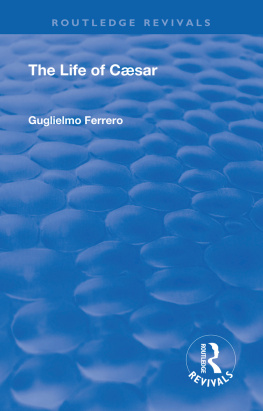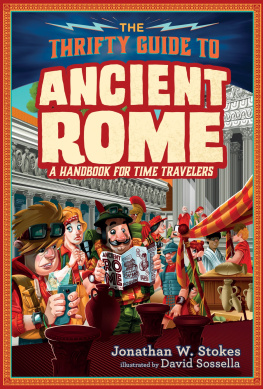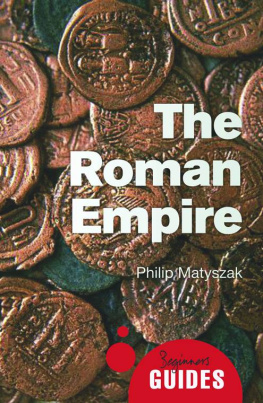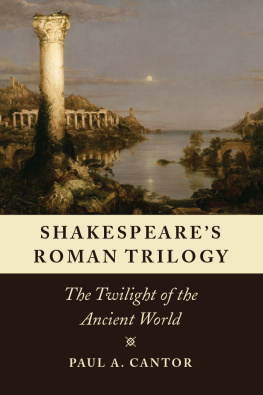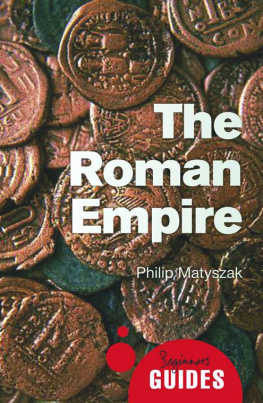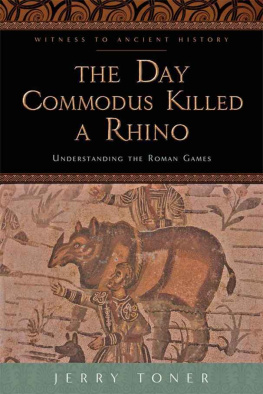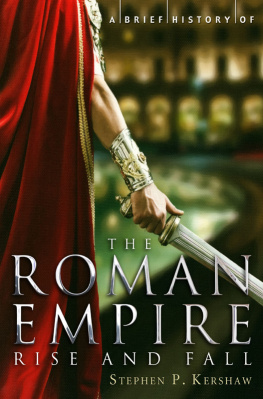Table of Contents
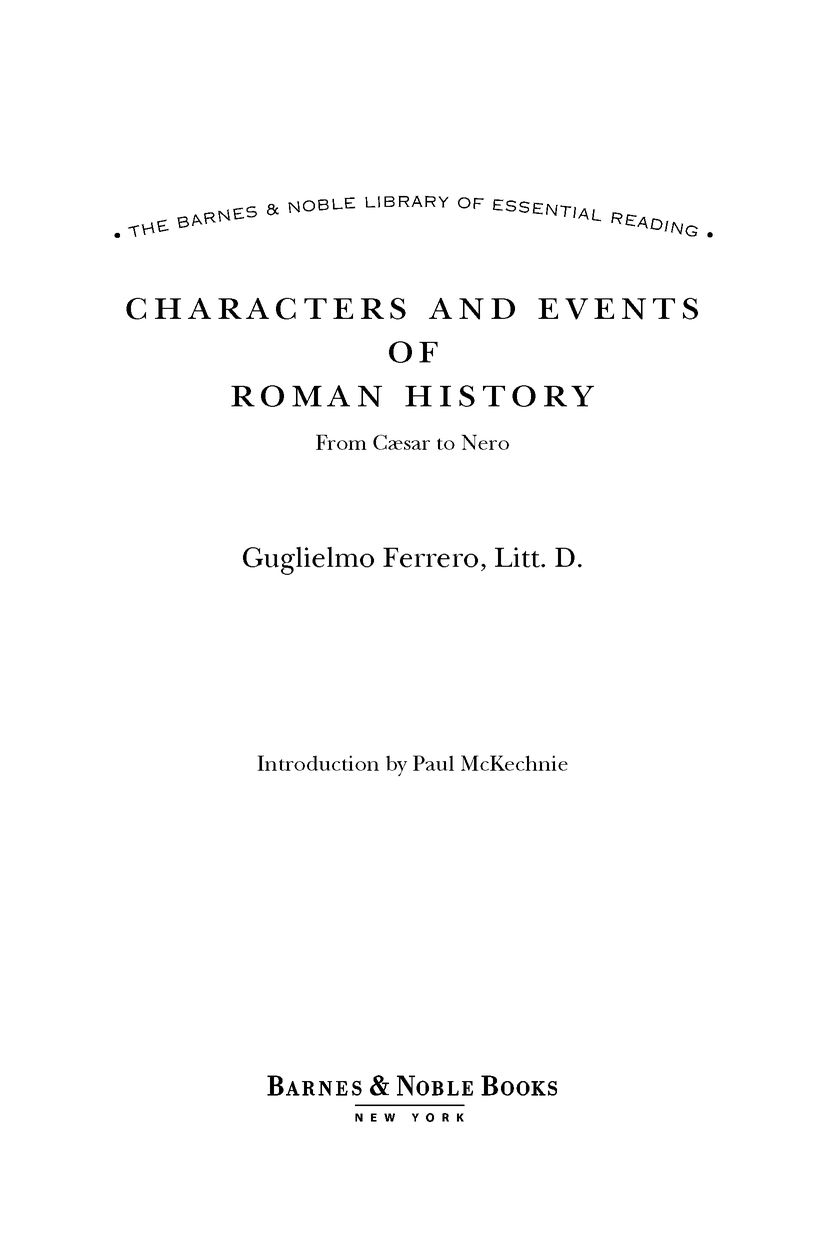
INTRODUCTION
In 1909, intellectual superstar Guglielmo Ferrero toured the northeast of the USA, accepted an honorary degree, and lectured about Roman history. Characters and Events of Roman History is the book of his lectures. It presents a lively selection of people and events: Julius Caesar, Antony and Cleopatra, the Emperor Nero and a chapter about the importance of wine to the growth of Rome. The response was warm. Ferrero, who had traveled widely in the European continent, argued that Rome is in the mental field the strongest bond that holds together the most diverse peoples of Europe. Throughout Characters and Events of Roman History, Ferrero explores the curious paradox of what Roman authors meant when they claimed that Rome lacked its ancient vigour and was fatally weakened by corruption at the very moment when (as we see it today) it was for the first time reaching the full extent of its power. As he treats these questions, Ferrero also reflects on his own times, on the brink of the new (twentieth) century. Frances Lance Ferrero, the authors sister-in-law, translated the lectures into English.
Born in 1871 in a middle-class Italian family, Guglielmo Ferrero started out as a law student and student radical in Pisa, then Turin. Curiosity and left-wing idealism impelled him into the growing field of criminology. After traveling across much of Europe in the mid-1890s, Ferrero in 1897 wrote LEuropa giovane (Young Europe), a book which caused a continent-wide sensation. Offers followed, and Ferrero chose to write columns for Il secolo, a Milan daily paper, and used the financial security gained from this to continue as a book author. In 1902, he announced that he would write a history of Rome: Its five volumes occupied more or less the next five years of his life. In 1908, invited by President Theodore Roosevelt, he visited the United States and gave the lectures that form Characters and Events of Roman History. With the rise of Mussolini, Ferrero became an opposition figure in Italy. He argued that protest and open opposition were the right reaction to Fascism; but he lost his newspaper column and spent much of the later 1920s living out of the public eye. Allowed to leave Italy in 1930, Ferrero became a professor of contemporary history in the University of Geneva, a job he held until his death in 1942.
The Ferrero phenomenon had gripped Europe for a decade by the time President Roosevelt invited Ferrero to the White House. He exemplifies a kind of social climbing in his case, from solid middle-class to internationally lionized hero of which he writes in general terms in the first chapter of this book: In the new generation, he says, the children...started where the previous generation left off, and therefore wish to gain yet new enjoyments, different from and greater than those they obtained without trouble through the efforts of the preceding generation. Ferrero had a brilliant student career. He enrolled at the University of Pisa in 1888, then in the following year visited Turin with a group of fellow-students and was introduced to Cesare Lombroso, who persuaded him to continue his university education there. Later, in 1901, Ferrero married Lombrosos daughter Gina. Ferreros undergraduate dissertation of 1891 was published as his first book, Il simbolo (Symbol), in 1893.
The left-wing ideas which impelled Ferrero to become a founder member, in 1889, of the Associazione radicale universitaria (University Radical Association), went on shaping his intellectual development. He seemed destined for an academic career. But an instinct for an audience beyond the academic milieu showed in the choice of subjects for his next two books, published (in collaboration with Lombroso) in 1893 and 1895: La donna delinquente (The Female Offender) and Il mondo criminale italiano (The Italian Criminal World).
Traveling to England in 1893, Ferrero made contacts in the British Labour movement. Back in Turin in 1894 he was put on trial as part of a government move to repress socialist organizations and sentenced to two months domicilio coatto (home detention) to be served at Oulx, high in the Val de Susa. But he was allowed to postpone serving this sentence until after another journey, this time to Berlin, Moscow (where he met Leo Tolstoy), and Scandinavia. Returning to his confinement at Oulx, he wrote in the spring of 1897 LEuropa giovane (Young Europe), outlining how young people could contribute to the potential he saw for Europe in the coming century. His earlier books had gained some attention, for instance because of the attempt in La donna delinquente to expound a link between cranial measurement and criminality in women, which had piqued public interest; but LEuropa giovane touched a highly responsive chord in the public mind and gave Ferrero the status of an intellectual hero: a status which he never lost.
Confidence in his ability bore Ferrero over the misgivings others felt when he turned his attention to the ancient world. When I expressed my intention to write a new history of Rome, he says in this book, many people manifested a sense of astonishment similar to what they would have felt had I said that I meant to retire to a monastery. Publishers as well as friends at first showed themselves sceptical and hesitating. Not that the plan was as eccentric as they thought: In 1902, the year when Ferreros first volume was published, Theodor Mommsen received the Nobel Prize for Literature for his Rmische Geschichte (History of Rome), finished a decade earlier.
Ferrero used ancient Rome to think with. He records (perhaps conceitedly) an incident at the Collge de France when an illustrious historian, a member of the French Academy complimented him, and he replied by saying, But I have not re-made Roman history, as many admirers think. On the contrary...I have only returned to the old way. I have retaken the point of view of Livy; like Livy, gathering the events of the story of Rome around that phenomenon which the ancients called the corruption of customs.
Corruption receives enthusiastic exposition in Characters and Events of Roman History. Livys famous sentence is quoted:
Rome was originally, when it was poor and small, a unique example of austere virtue; then it corrupted, it spoiled, it rotted itself by all the vices; so, little by little, we have been brought into the present condition in which we are able neither to tolerate the evils from which we suffer, nor the remedies we need to cure them.
The near unanimity of Roman voices on this sentiment in their literature, politics and legislation is placed alongside Romes long-continued success in governing an immense empire. What kind of thing is corruption, Ferrero asks, if it is something which both provokes that moral reaction and promotes (or at least does not impede) those practical results?
Ferreros answer, in brief, is that corruption is the name the Romans had for what the modern world calls progress the ancient moral objection arose from observing the historic force that, as riches increase, impels the new generations to desire new satisfactions, new pleasures. This opens a door for moral commentary on twentieth-century life: Ferrero reflects on ancient sumptuary laws as contrasted with modern freedom to consume; on relations between the Western world and the Eastern, parents and children, men and women, the decreasing birth rate. Foreboding seems to overshadow the authors words when he says, we can boast in the pride of triumph that we are the first who dare in the midst of a conquered world, to enjoy enjoy without scruple, without restriction all the good things life offers to the strong.


